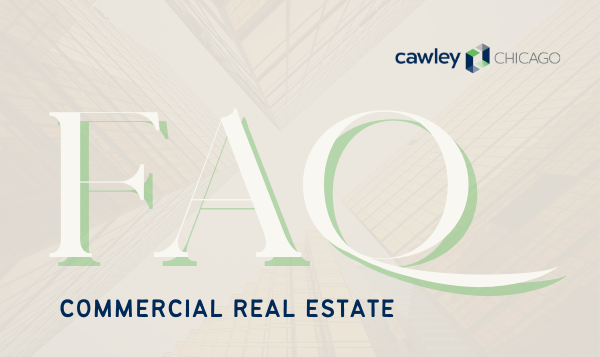Commercial real estate (CRE) refers to property used for industry, intended for generating income. This wide array of real estate embodies; office space, industrial, retail, multi-family, mixed-used, land, hotels, and/or special use. Commercial real estate brokers are experts within their field and aid their clients navigate this tedious process of selling, buying, or leasing commercial properties.
To dive deeper in the commercial real estate world, Cawley Commercial Real Estate‘s marketing team curated a set of frequently asked questions with insights provided by Joe Shapiro, Associate Broker at Cawley Commercial Real Estate.
1. What is a commercial real estate broker?
A commercial real estate broker is a licensed professional who helps businesses with their real estate needs. Commercial real estate brokers help clients buy, lease, sell, or rent properties such as offices, manufacturing facilities, distribution warehouses, retail locations or even truck parking lots.
2. How do you become a commercial real estate broker in Illinois?
In order to become a commercial real estate broker, you will first need to get your license through a course like, REI. In Illinois, this was a 75-hour course that prepares you for the state exam. After taking the Illinois state exam in person and passing, you must hang your license with a managing broker. I would recommend choosing a specific property type in commercial real estate (Example: office, retail, or industrial) and joining a team who specializes in that field.
3. Do I need a commercial real estate broker?
A commercial real estate broker typically saves professionals money and future headaches. Going into a real estate deal without a broker has similarities to going to court without a lawyer or to meeting with the IRS without an accountant. While neither the lawyer or accountant are necessary, they end up saving clients extreme amounts of money and saving people lots of time.
4. Who pays broker fees in commercial real estate?
Generally, the company selling/leasing their facility pays broker fees in commercial real estate. Sometimes, if this is an off-market deal, the tenant/buyer will pay the commission.
5. What does a typical day look like for you?
From 7am-9am I respond to any emails from the night before and get organized for the day whether that be writing down all of the addresses I will be driving to or contacts I will be reaching out to help.
From 9am- noon I am normally speaking with current clients and future clients on the phone about their real estate needs. Also, I use this time to contact other brokers and city zoning departments to confirm which properties will work for my client.
From noon – 2pm is when I like to get in my car and drive through my industrial parks; looking for properties that look completely vacant or overly packed. If vacant, the owners may want to sell or lease it out. If the property has every car spot filled and product throughout the lot, the business owners may be looking for me to find them more space.
I like to set up my property tours from 2-4pm.
After 4pm, it is back to the office work to answer phone calls / emails from clients that I was unable to get to on my tours. I also like to end the day having a recap with my team members to go over our clients with the most immediate needs.
After 5pm is the time to work on out of office work, such as gathering information on all available properties for a specific clients’ real estate need.
Looking for commercial real estate (CRE) in the Chicagoland area?
As Cawley Commercial Real Estate answers some of most frequently asked questions, if you are looking to buy or sell a commercial property in the Chicagoland area and need assistance from a broker, please feel free to contact us. Our highly skilled and experienced experts will help you along this process and can answer any questions you may have.



